







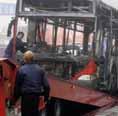













































RMT has developed a number of benefits to save members money. This includes negotiating access to savings and special offers from our approved partners.
The union has a dedicated team of elected officers and local reps to serve your interests negotiating with employers on issues from pay, hours of work, pensions and working conditions. They are supported by a team of researchers to formulate pay claims to obtain the best negotiated terms for you.
The union has a political fund to run campaigns and provide a political voice to benefit members’ interests in the workplace. RMT has a very active parliamentary group which raises issues of concern for members at Westminster, the Scottish Parliament and Welsh Assembly.
Personal injury claims cover if you suffer an accident in work or outside work. RMT underwrites settlements that would not be provided by no-win, no-fee companies. Call 08457 125 495.
Members who have suffered an industrial disease will receive free legal support to make a claim. Such claims are underwritten by the union and members will not have any deduction from their settlement unlike claims run by no-win, no-fee companies. Call 08457 125 495
EMPLOYMENT TRIBUNALS
Should a member find themselves unfairly
dismissed, discriminated against or have any claim which has reasonable prospects of success at an Employment Tribunal, RMT will provide legal representation and pay the fee. Even if the union is advised that the claim is unlikely to succeed, members who make a claim are eligible to receive free legal advice.
ACCIDENT
Payable if you have an accident at work or on the way to or from work. Accident benefit is only payable if you have been off for three days or more. Accident must be reported to branch secretary within 26 weeks in order to qualify for accident benefit.
Payable to any member who retires over the age of 60 or aged 55 if retired through redundancy or resettlement. Ill health retirement is also payable; proof of this must be sent with application for retirement benefit.
The union can provide a personal taxation service and will preparation service.
Payable to any member who is experiencing loss of wages through being permanently demoted or downgraded as a result of illness or injury.
Payment of £300 provided that member reports this to branch secretary within 12 weeks.
The beneficiaries of this fund would be any child of a member or spouse if the member dies in service or if a members’ spouse dies and the member has responsibility of the children. Benefit is paid while a child is in full-time education up until the age of 22. Payment is made quarterly and the rate is £12.00 per week for children up to the age of 16, then £12.75 per week from 16 to 22.
Accessible savings and affordable loans from RMT’s Credit union. www.rmt.org.uk/about/credit -union
Shop online with RMTrewards.com and earn cashback savings from hundreds of retailers, like B&Q, Argos and Tesco. It’s free to join, plus you’ll get a FREE £10 Welcome Bonus in your online account! (Terms and conditions apply) www.rmtrewards.com
if you drive a company vehicle as part of your job you can join the RMT fines pool for £7 per year. The Fines Pool will reimburse members for any speeding fines, related court costs and lost time to attend a court hearing. www.rmt.org.uk/memberbenefits/fines-pool
A Death Grant of £600 is payable to the nearest relative or legal representative if a member dies through any cause prior to retirement.
Fancy cashback on your everyday shopping? Use your RMT Prepaid Plus Cashback card at over 50 partner retailers, including Sainsbury’s, ASDA and Boots, and earn unlimited cashback! It’s different to a credit or debit card - you can only spend what you load so there’s less chance of getting carried away.
www.rmtprepaid.com
As a benefit of your RMT membership you can register for £5,000 Free Accidental Death Cover. Cover is for UK residents aged 18-69. 12 months free cover. Annually renewable and always FREE. The Cover is underwritten by Advent Insurance PCC Ltd – UIB Cell. www.rmtprotect.com
For a small monthly premium you can claim cash-back on dental, optical and therapy treatments. Visit www.bhsf.co.uk
Join RMT by visiting www.rmt.org.uk
Thismonth you will receive your voting paper in the re-ballot in the national rail dispute demanded by anti-trade unions laws in this country in order to maintain your mandate for strike action. It is vitally important that you vote Yes in this reballot.
By standing together you as RMT members have already prevented job losses and attacks on conditions, forced the train operating companies to improve their offers on pay and job security and removed the threat of Driver-Only Operation.
You have also built a campaign to save ticket offices and protect all station staff which has gained massive public support and the TUC is now demanding a meeting with the government to halt the dehumanisation of the rail network.
Disabled campaigners have also pointed out to the Commons select committee that even the consultation process itself had been inaccessible for many vulnerable people and the proposed cuts would threaten their right to travel.
The whole process has been a sham because if the watchdogs do object after around three quarters of a million responses it goes straight back to the government’s transport secretary that initiated the entire closure programme with the private train companies in the first place.
RMT has also won support at TUC Congress to oppose the draconian Minimum Services legislation which forces trade unions to tell their members to cross their own picket lines.
TUC delegates agreed that we cannot meekly accept this attack on what is a basic human right because compliance with this legislation is the road to oblivion for the trade union movement.
The union is also calling for an end to continual cuts to rail maintenance and renewals after Network Rail was fined £6.7 million this month for safety failings which led to the Carmont disaster which killed three people including our well-respected
member Donald Dinnie.

A Rail Accident Investigation Branch report into the train derailment caused by poor drainage work made 20 recommendations to improve rail safety which have been largely ignored.
For instance, Network Rail initially agreed to create drainage teams to deal with issues that caused the derailment but has since abandoned the plans claiming that it does not have to do it.
This cavalier approach to health and safety must be replaced with a regime that is not dictated by government budget cuts and endless austerity.
The union has also called for more action to be taken on bus fires after a government study identified significant delays and deficiencies in the reporting of incidents. Bus operators are legally required to report vehicle fires, but many reports are incomplete or inaccurate and often without root cause investigations.
We need to have legislation introduced that oversees the manufacture of buses in this country, ensuring that the least flammable materials are used at the very least.
It is encouraging to see that a new report by the OECD’s International Transport Forum into maritime jobs and the role of governments includes the recommendations that are already long standing RMT policy.
We need mandatory links between seafarer jobs, the UK flag and state aid like the Tonnage Tax scheme which would secure better jobs and stimulate the further education sector, strengthen the maritime skills base and grow the national economy.
Ultimately, privatisation and the use of profit hungry contractors on the entire transport network including ferries, buses and rail has made it less safe and it is our belief that public ownership would be best for workers and passengers alike.
A mass rally saw RMT members, trades unionists, disability campaigners and supporters march on Downing Street last month to tell the government in no uncertain terms that ticket offices must be saved.
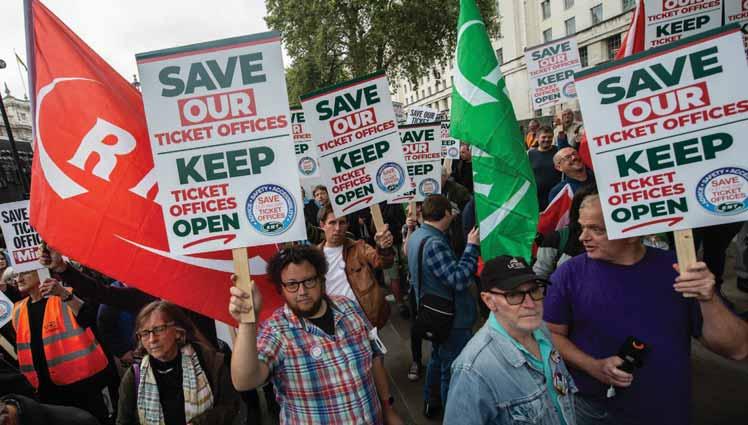
The rally took place a day before further strike action earlier this month by 20,000 railway staff working on 14 train operating companies in the long-running dispute over working conditions, job security and pay.
A consultation on the future of ticket offices by transport watchdogs London
TravelWatch and Transport Focus has received over 700,000 responses and the union has built a broad campaign to stop the dehumanisation of the rail network.
Current plans will see up to 1,000 ticket offices closed and 2,300 rail jobs are in jeopardy.
RMT general secretary Mick Lynch told protestors that the public response to the government wanting to shut every ticket office in England had been very encouraging.
"People from different walks of life recognise the value of ticket offices and the
station staff that support passengers on their journeys.
"Rail companies and their government masters do not care one jot about disabled people, vulnerable passengers and those travelling alone who welcome a human presence on our railways.
"These plans lock in age and disability discrimination and if they are carried out, it will mean many vulnerable passengers will not feel safe using the network.
“We hope that the watchdogs will reflect on the huge opposition to this
monumental act of social vandalism and defend a universal public service which should be available to all.
“The drive to close ticket offices in the name of profits is clearly a political decision of this out-of-touch Tory government and it must be stopped,” he said.
London TravelWatch and Transport Focus will publish the response to each train company’s proposal by October 31 and if they object the train company can refer its proposal to the Secretary of State for a final decision.
Sarah Leadbetter of the National Federation of the Blind of the UK said that the right of disabled people to enjoy spontaneous travel on the rail network was under “serious threat” because of the planned closure of nearly 1,000 ticket offices.
“Research by disabled people has already shown how the government-backed closure plans will have a disastrous impact on disabled passengers, and lead to a significant fall in the number of staff available to support them.
“We believe that their right to spontaneous travel through the turn up and go (TUAG) system is now under clear threat.
“Evidence that has emerged during the ongoing consultation is raising increasing concerns that the right to TUAG could effectively be ended at many stations if the closures are allowed to go ahead,” she said.
Paula Peters of Disabled People Against the Cuts said that the closures would make it, ‘ten times harder than it already is’ for people with disabilities to use the transport system. With the closures disproportionality effecting elderly, disabled and vulnerable passengers.


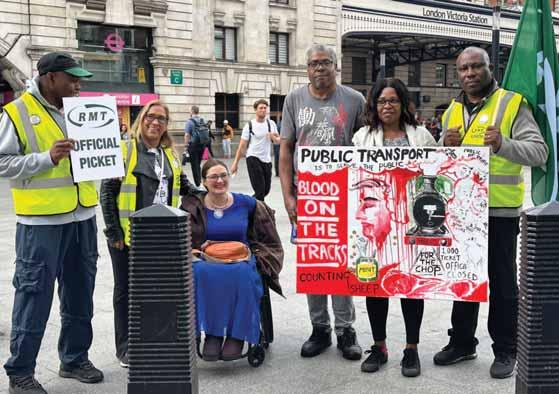
“For a lot of disabled people, they’re not going to be able to access the rail network at all, it’s a catastrophic move by the government,” she said.
Tan Dhesi, Labour MP for Slough and Shadow Minister for Railways, also joined the rally to tell protestors that the closures were part of the managed decline of the rail network.
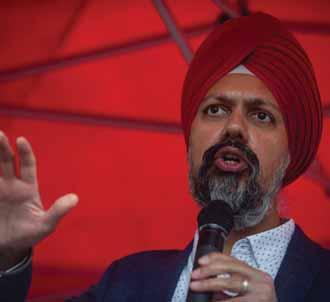
“The consultation process was a sham from the start and it was only extended due to the sheer volume of people protesting against these dangerous plans which will only have a negative impact for vulnerable people,” he said.
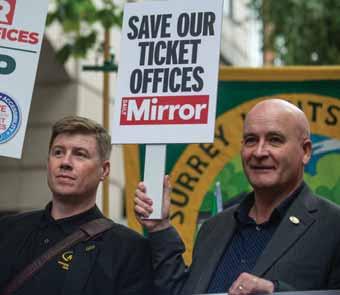
Engineers, clerical staff and production operatives working for Unipart Rail in Crewe launched four days of continuous strike action late last month.
RMT members remain angry that management has been unwilling to improve a derisory 4.75 per cent which the union has flatly rejected.
Despite attempts by union negotiators to recommend a pathway to a resolution, Unipart cancelled a last-ditch meeting, torpedoing any chance of calling strikes off.
RMT general secretary Mick Lynch said that Unipart bosses continued to behave in an intransigent manner and shown a complete disregard
for its own staff.
“Our members have rejected a derisory pay offer, but despite attempts by our negotiators to reach a
settlement, Unipart bosses cancelled a last-ditch meeting, showing no interest in trying to resolve the dispute.
“RMT remains determined
to reach a negotiated settlement on pay and conditions and is willing to take more strike action if necessary,” he said.
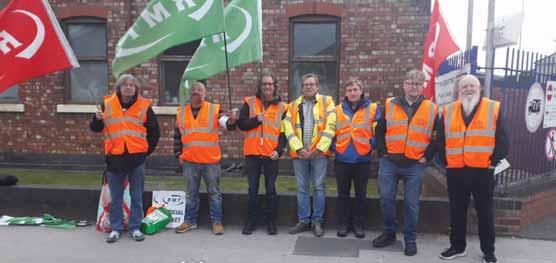
Contracted out caterers will took two days of strike action at TransPennine Express last month over poor pay, pensions and sick pay.
RMT members working for Rail Gourmet on TransPennine Express services get lower pay and poorer terms and conditions than colleagues directly employed by the train operator.
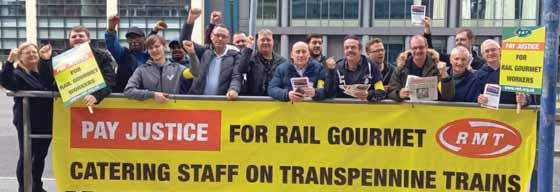
Rail Gourmet made £1.4 million in profit last year but has refused to make a decent offer.
There have been reports that TPE have been training up workers to break the strike, paying them a reported £25 an hour - far more than Rail Gourmet staff on TPE earn.
RMT general secretary Mick
Lynch said that greedy rail contractors had too long exploited members and Rail Gourmet was no exception.
“Despite making more than a million pounds in profit, Rail Gourmet are refusing to offer staff a decent pay rise, sick pay or a good pension.
“Rail Gourmet staff wear the same uniform and work
just as hard as directly employed TransPennine Express workers.
“Yet they earn considerably less and will be left in poverty in retirement all because TPE contract out their catering services.
“TPE bosses have also taken the disgraceful decision to begin training scab labour
at an hourly rate more than double what Rail Gourmet staff currently earn.
“RMT will not rest until we achieve a reasonable settlement on pay, pensions and sick pay. And our members are fully prepared to take further industrial action if necessary,” he said.
By standing together you as RMT members have already:
The stakes couldn’t be higher: If the union does not win the ballot, the employers will have a free hand to attack your jobs and pay. Your action does get results. But now workers must stay united and win a proper deal.
•Prevented job losses and attacks on conditions
•Forced the TOCs to improve their offers on pay and job security
•Removed the threat of Driver-Only Operation
•Built a campaign to save ticket offices and protect all station staff that has won massive public support
Vote Yes to fight for:
•A guarantee of job security and no detrimental changes to your conditions. The attack on ticket offices and stations shows what lies in store if we are pushed back. The jobs and conditions of catering, traincrew, engineering and all grades are under threat.
•A decent pay rise. The cost-of-living crisis isn’t going away, the money is there in the system and train operating companies are still making profits and awarding themselves pay rises of between 15 and 168 per cent!
•Strengthen the arm of your negotiators. A united union response has forced them back to the table. We must win the re-ballot to keep the talks on track.
RMT won support at TUC Congress to oppose draconian Minimum Services legislation, pledging to explore options of non-compliance with the new Tory laws.

Delegates from across the trade union movement unanimously backed the call to resist the legislation and to organise a special congress with other unions to focus on what methods of noncompliance can be pursued.
Amongst the demands the TUC general council will take forward include legally challenge the legislation, coordinate demands that employers, devolved governments, and local authorities do not issue work
notices, call a national march calling for repeal of the antiunion laws, organise a special Congress to explore noncompliance and resistance and mobilise support for anyone sanctioned for noncompliance.
Speaking to rapturous applause at Congress, RMT general secretary Mick Lynch said: "The notion we will identify our members to tell them to go to work or tell our picket supervisors to instruct their work mates to go past their own picket line, is a nonsense. We will not be complying with that and we will not do it.
"That's got to be the message from this Congress.
Our stance is non-compliance - that's what it says and that's what we have got to deliver.
"We need a special congress and we have to work out what we will have to do to not comply.
"Let's not accept this meekly, meek compliance with this legislation is the road to oblivion for this movement.
"Nobody remembers those that comply with oppression. People remember the Tolpuddle Martyrs, the chartists and the miners - not because they gave in but because they fought back.
"That's the message and that's what we have to do. We are fighting workers movement and we are going
to turn this legislation over and defeat it in the workplace and on the streets," he said.
At fringe event hosted by the Trade Union Coordinating Group (TUCG), Mr Lynch emphasised the importance of voting Labour at the next general election.
"The Labour policy is for the re-nationalisation of the railways. And the new deal for workers is something we can all support. Of course, it is not perfect but that's why they call it a struggle - it goes on and on.
"The new deal for workers has to be undiluted and unfiltered.”
Mr Lynch added that workers have never had a legal
right to strike in Britain and there currently exists an exemption in the law which allows you to strike through your trade union if strict rules are adhered to.
"We are indemnified from the consequences of taking strike action. But we want Labour to put in statute the right to strike,” he added.
RMT's ticket office campaign has won public support with over 700,000 consultation responses on closures.
Delegates passed an emergency RMT motion "to fully support the rail union affiliates in their campaigns to prevent redundancies and protect jobs and conditions, and for fairer pay and fair fares and for a properly staffed, expanding, publicly owned railway as vital to attracting passengers back to our railways and meeting the climate change challenge".
RMT also slammed the government’s destructive policies and their approach to the railway and London Underground disputes.
The rail minister has admitted the cost of settling the rail disputes would have been less than the billions lost from the cost of the disputes to the economy and from the bankrolling of private train companies.
Moving the unanimously backed motion, RMT president Alex Gordon said: "The government is working hand in glove with rail company bosses to cut a thousand railway ticket offices.

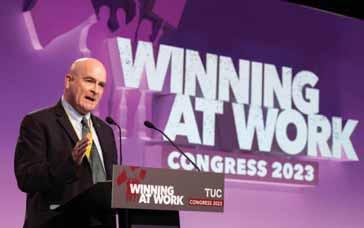
"Ticket offices make our railways safe accessible, especially for women, older people and people with disabilities," he said.
He accused the government of waging "war on London Underground staff with cuts to TfL budgets that are being used to attack members terms, pay and conditions".
Safety has been a key issue in the transport industry with high profile Carmont court
case and the failures of Network Rail.
Expressing support for the FBU’s motion on fire safety and opposing cuts, RMT senior assistant general secretary Eddie Dempsey said that members sometimes had to work closely with the fire brigade at accidents, adding: “Our fire service is being rolled back as part of the managed decline of Britain”.
First time speakers at conference Jas Breyal and Mel Mullings both spoke to support motions on ending child poverty and fair funding for public services respectively.
Ms Mullings also moved the successful TUC Black Workers Conference motion on ending the hostile environment and establishing a statutory judgeled public inquiry into how the Windrush scandal came about and the failings of the compensation scheme for victims.
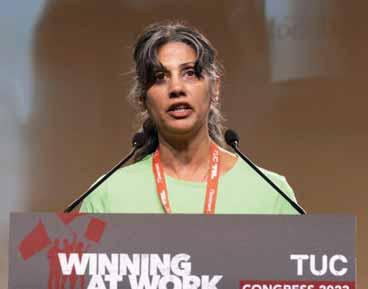

“We are still fighting to get justice and adequate compensation for those affected by the hostile environment. The compensation scheme must be run independently and people are still being affected because they are being deemed to be ineligible,” she said.
On maritime, RMT seconded a successful motion on tackling flags of convenience and growing domestic shipping with RMT delegate David Douglas pointing out that the government’s voluntary seafarers charter introduced in response to P&O sackings last year must be mandatory.
And the union received praise throughout conference on its militant stand in transport, offshore and maritime.
TUC general secretary Paul Nowak credited RMT in his keynote speech for its campaign over P&O pledging a joint organising initiative with Nautilus to ensure there are no more P&O scandals in the future.
NOTORIOUS: Bus fires briefly hit the headlines in 2004 following a series of fires on London's ultra-long "bendy buses”. Recovery workers are removing an articulated bus gutted by fire from London's Edgware Road in March of that year.
RMT welcomes government report accepting that bus fires remain a clear and present danger

The union has called for more action to be taken on bus fires after a government study identified significant delays and deficiencies in the reporting incidents. Bus operators are legally required to report vehicle fires, but the DVSA said that many reports reached it long after the event, with incomplete or inaccurate details, and often without a root cause investigation.
The recent investigation by the Driver and Vehicle Standards Agency (DVSA) has accepted the necessity of prompt reporting and thorough maintenance in the prevention of bus fires. DVSA's study, which analysed incidents reported between 2020 and 2022, offered actionable lessons for the coach and bus industry.
DVSA manager Ian Bartlett emphasised the agency’s role in improving bus safety, particularly the value of early reporting in understanding the sequence of events leading to a fire and asked bus operators to report incidents as soon as possible after it has taken place.
He stressed the vital role of thorough and regular maintenance in ensuring the safe operation of buses. He recommended that operators replace components with the correct specification, carry out maintenance inspections at the stated intervals, identify and repair faults immediately and replace heat shields and check cables and fuel lines are correctly routed.
Mr Bartlett acknowledged the commendable handling of fire incidents by drivers and the effective evacuation of passengers during these incidents and advised operators to ensure that their drivers are properly trained, understand vehicle warning systems, and are aware of bus evacuation procedures.
He invited the industry to review the study findings and provide feedback to facilitate a safer future for all bus services. “This way, we can help you
address issues and make sure that together we provide safe bus services for all,” he said.
However, serious bus fires have continued to occur with a Stagecoach bus catching fire in Swindon town centre during rush hour on July 5 and another fire on a doubledecker Arriva bus on the same day in Blackrod, Bolton. A fire a week later destroyed a bus on an Arriva service in Leicestershire forcing a road to be closed for several days.
RMT regional organiser and bus fire campaigner Barry West welcomed what he described as a ‘long overdue report’ from the DVSA which vindicated the long running campaign on bus fires which he had led for the over seven years.
“Bus fires were and still are a serious safety concern and the evidence I have been able to collate demonstrate that there are a significant number of bus fires occurring on an all too frequent basis.
“Many of which are catastrophic, the ferocity of the fires and intensity is alarming and the DVSA report is merely a small snapshot of the issues that are evident.
“Sadly, the DVSA have been all too quick to apportion blame on drivers, instead of focusing on the root causes or understand the behaviour of those who are frequently instructed to
continue driving by their employers despite reporting faults to those in charge the pleas for support have largely gone unheard.
“The materials used in the construction of buses are banned in public buildings, planes and trains. So, there is more work to do and legislation to review and change so that that Important improvements to the design and construction of buses are safer in the future.
“Unfortunately, there are many buses and coaches in circulation that have been in service for 20 years plus so it will take more than a generation to realise the benefits in many cases.
“There would in my opinion be great value in having a National Bus Fire Safety Conference to discuss and debate the findings of the recent DVSA investigation and report.
“This should include a wide range of participants such as bus builders and designers, bus companies, trade unions, the Fire Service, the DVSA, safety experts and, in particular, the eminent fire safety expert Professor Guillermo Rein.
“The safety of the public deserves and depends on a much-improved safer bus or coach to travel on, many of whom are the elderly the vulnerable and children.
Changes need to be made, or we will be sleep walking into a Grenfell type situation on the buses and coaches that provide the public with a much-needed transport system,” he said.
RMT general Secretary Mick Lynch said that the report made some important recommendations around improved comprehensive and regular maintenance schedules, insisting that operators report fires in a timely manner and better training of drivers to encourage reporting of defects as soon as possible.
"Academic research shows that buses may be significantly riskier than cars, trains, ships or aircraft, mainly due to the less-stringent fire-safety requirements governing them, and concern that the probability of bus fires is two to three times higher than cars.
"We need to have legislation introduced that governs the manufacture of buses in this country, ensuring that the least flammable materials are used.
"The union has had successes in our campaigning on bus fires and will continue to push for the maximum health and safety protections for our members in the cabs and at bus garages and depots,” he said.

Whenyou’ve got something to say, you want to be heard. But it’s not always easy to find a listening ear. If you’re speaking up and your concerns aren’t getting through, it can be frustrating, and worrying if there could be real-life consequences for your team’s or the public’s safety and wellbeing.
There are many reasons why someone might not be listening actively. It’s not just about personality clashes or seeing things differently –although these can mean someone doesn’t want to hear what you have to say – but it’s also about the situation. Line managers or supervisors could be stressed, overworked with their mind on other things, too tired to really hear, or even not fully understand the issue you are raising. This isn’t ideal, but it could be the reality.
That’s why companies offer channels for raising issues and concerns. Many of these are internal, within the company, but did you know you can also use the independent channel CIRAS to raise work-related health, safety and wellbeing
concerns confidentially?
Because CIRAS is independent, it means you can use it to be heard by your employer – or to get your concerns heard by other companies who aren’t your employer, such as a contractor or client.


We’ll pass your concern on to whichever company it’s for. You don’t need to have reported your concern internally first. We do recommend you use other channels instead of CIRAS for any immediate, real-time safety concerns.
When you use CIRAS, you’ll speak to one of our reporting analysts, who will take the time to listen to what you have to say and then write up a report for the company –without sharing any details about you. You remain confidential. The company will make sure your concern gets to the right person to investigate and act on the information, and you can be confident that the focus will stay on the issue itself, not who reported it.
CIRAS confidential
reporting is available across transport and infrastructure sectors, so we’re here for you wherever you work.
How do we listen? By paying attention.
One of our reporting analysts will arrange with you a suitable time for them to call you and discuss your concern fully, so they can write it up accurately in their report. They are professional listeners, and they will ask you questions to fully understand your concern. It’s not just to check that we can protect your confidentiality, but also to make sure the report captures all the potential safety or wellbeing consequences of the issue raised.
There is a difference between really listening to understand (active listening) and listening out for something you want to hear or to work out what you’ll say next (passive listening). If you listen passively, you don’t really hear what’s being said, and you might be listening through a filter of personal
interpretation or with an agenda.
You can be confident that our trained listeners have no agenda. Their only aim is making sure information that could help with safety and wellbeing is shared effectively, giving the maximum opportunity for any issues to be resolved.
Now you can report your concerns on the go! Download our NEW app on Google Play or the App Store – the QR code will take you to the right one for your phone. Find our app demo video on youtube.com/@CIRAS_reporting.
Or you can call 0800 4 101 101, use Freepost CIRAS, or fill in the form at https://www.ciras.org.uk/raisea-concern

RMT called for an end to continual cuts to rail maintenance and renewals after Network Rail was fined £6.7 million at the High Court in Aberdeen earlier this month for safety failings which led to the Carmont train disaster.
The company in charge of rail infrastructure in Britain admitted to health and safety failings over the rail crash at Carmont near Stonehaven three years ago which claimed three lives.
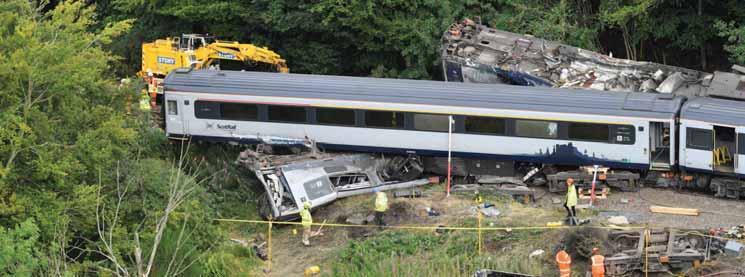
Network Rail admitted that to failures in the construction, inspection and maintenance of drainage assets and in adverse and extreme weather planning.
The company also admitted it failed to impose an emergency speed restriction and failed to inform the driver that it was unsafe to drive the train at a speed of 75mph or caution him to reduce his speed.
Driver Brett McCullough, conductor and RMT member
Donald Dinnie and passenger Christopher Stuchbury died when the train derailed on August 12, 2020.
A Rail Accident Investigation Branch (RAIB) report concerning the train derailment caused by poor drainage work made 20 recommendations to improve rail safety which have been largely ignored.
Network Rail had initially agreed to create drainage teams to deal with issues that caused the derailment but it had since abandoned the plans claiming that it does not have to do it.
RMT general secretary Mick Lynch said that although NR had admitted guilt over failings in construction, inspection and maintenance of drainage assets it was still planning widespread cuts to maintenance and renewals.
“The company has already effectively ignored most of the recommendations made by the RAIB and now it is cutting back on maintenance,
renewals and drainage work.
“Instead of fining the publicly-funded body, Network Rail should be forced to halt the culture of continual cutbacks which will inevitably lead to a more dangerous railway.
"Network Rail's attitude to safety has been abysmal as currently there is a massive shortage of staff on the ground, sometimes with a couple of people responsible for 100’s of miles of rail track, often located in areas at high risk of flooding and landslides.
"Privatisation and the use of profit hungry contractors on the railway has made the whole network less safe and it is our belief that public ownership would be best for railway workers and passengers," he said.
The court was told an investigation found that if a drainage channel constructed by Carillion which overflowed on the day of the crash had been built correctly it would
have been able to cope with the washout of gravel that led to the derailment.
RMT has highlighted numerous areas of concern where a lack of action by the government and Network Rail has increased the risk of a further tragedy. The ORR also “identified concerns with a reduction in volumes of earthworks-specific drainage and Network Rail’s proposal not to use dedicated drainage teams, which is not consistent with one of the recommendations made by Lord Mair on managing rail infrastructure in more frequent extreme weather”.
A recent RAIB report about an embankment washout under a passenger train at Haddiscoe, Norfolk also said that the train involved was not prevented from entering the flooded section of track because Network Rail’s flood risk management processes were not effective at warning that the track was at serious risk of flooding.

German railways Deutsche Bahn (DB) was created on January 1, 1994 following the merger of east and west German railways which created a government-backed private joint stock-company with hundreds of subsidiaries. While the federal government remained the nominal owner its only role was to take on historical debts and £4 billion in yearly pension obligations.
As a result of this arrangement DB is not subject to public sector law. However, it has become global giant in freight logistics and passenger transport buying up Britain’s largest rail freight operator EWS in 2007 and rail and bus operator Arriva in 2010, as well road hauliers around the world in more than 150 countries.
German rail infrastructure has also become a byword for underinvestment, catastrophic decline and delays. The Sunday Times recently revealed that Swiss railways was now refusing to let German trains access to its network because of delays caused by Germany’s collapsing rail infrastructure.

Swiss Transport authority head Peter Fuglistaler said: “Half of the international trains from Germany arrive late in Basel. If we let them continue, it would mess up the Swiss timetable”.
So how did the myth of German railway efficiency collapse so profoundly? The answer lies in the neo-liberal dogma pervading DB which ensures little or no governmental or democratic
control.
Back in December 1993 German MPs had voted overwhelmingly to merge Bundesbahn, west German railways, and the former east German network Reichsbahn and turn them into a private stock company, known as Deutsche Bahn AG (DB AG).
DB AG was to be three new
stock companies, for passenger transport, freight transport and a third for infrastructure. This form of deregulation removed ‘civil servant’ status from nearly half of all rail employees who had previously enjoyed a lifetime no compulsory redundancy guarantee.
At the same time, a Tory
government in Britain was selling off our rail network also in accordance with the notorious European rail directive 91/440/EEC that came into force on July 29 1991 which required functional and ownership separation between rail infrastructure and operations, open access and the introduction of track access charges.
The UK and Germany took markedly different routes in order to be seen to be moving towards fulfilling these EU neoliberal demands, yet both models have produced the same disastrous results: decline, disinvestment and, ultimately, fatal train crashes.


John Major’s Tory government opted to fully liberalise the rail network immediately with full scale privatisation by breaking up British Rail into 25 passenger rail franchises, five rail freight operators and eventually selling off rail infrastructure to carpet bagging speculators thereby creating the disaster known as Railtrack plc, which was floated on the London
Stock Exchange in May 1996.
In contrast, the German government recognised that rail was a ‘natural monopoly’ and decided to keep rail infrastructure and operations within the same mother company DB AG which, contrary to EU separation and equal access rules, blocked private competitors from gaining a foothold in what was effectively a private rail monopoly.
At the same time DB was exploiting the break-up of rail networks in other member states being demanded by Brussels to gain access to lucrative rail markets across Europe using profits from German railways.
As rail infrastructure owner, DB had effectively become the largest landowner in Germany overnight, but it did not record the land and facilities in its balance sheets. Instead, it sold off assets to generate revenue through a series of fire sales of formerly public land.
Thus began a process of exploiting undeclared crosssubsidies to finance and
expand DB’s international operations while closing down its domestic rail services. As part of this managed decline, in 2003 DB scrapped its famous inter-regional train services known as Inter Regio trains forcing passengers onto the more expensive Intercity Express (ICE) trains, or slower and more complicated local networks.
Moreover, according to Carl Waßmuth of the Rosa Luxembourg Foundation, contracts between Deutsche Bahn and the German government stipulate that DB only has to pay for minor infrastructure repairs, while the Federal government remained responsible for large-scale damage and replacement construction works. This has proved to be a perverse incentive for DB to turn smaller infrastructure issues into much larger ones.
“Since 1994, DB AG has shortened the rail network in Germany by 33,440 kilometres, or 17 per cent. To save money on maintenance and repair work, it also tore out thousands of railroad switches (crossovers) and dismantled many passing loops and railway sidings.

“This means that if a train is now delayed, all subsequent trains on this line will also be delayed until operations are
completed. This has had a massive impact on rail freight services. Thousands of stations were also first reduced to ‘passenger buildings’ and then later sold off.
“These construction projects are destructive in that they both reduce the rail network’s capacity and hinder its future expansion by creating absurd bottlenecks,” the Rosa Luxembourg Foundation said.
Despite the fact that rail liberalisation was introduced in drastically different guises in Britain and Germany it has created the same dynamic of profit over public need and led to dangerous underinvestment, collapsing infrastructure and decline.
The German Federal Audit Office reported earlier this year that DB was in a “chronic crisis” noting that its debt was now £26 billion and climbing by around £4 million per day.
As a result, political calls for democratic control of the railways are growing in Germany as the current deregulated model cannot even respond to the country’s basic transport needs let alone encourage the switch from cars and planes to an expanded rail network in order to meet the challenges of the climate crisis.
According to an RMT report the private train operating companies who are currently closing ticket offices, calling for driver-only operations and cancelling services are racking in the money while the government bankrolls their hard line in the rail dispute.
In fact, train company bosses take little risk with their capital but have benefited from profits before tax of 126 per cent of the capital invested. Moreover 65 per cent of profits are locked away in shareholder dividends instead of being redistributed into improving the railway or upping workers’ wages and

improving conditions.
RMT general secretary Mick Lynch said that the public needed to understand that train companies invest little or nothing in the railways and make completely unjustifiable profits which they squirrel away in shareholder dividends and bosses pay packets.
"It is a scandal that the travelling public is being ripped off by greedy rail privateers while at the same time the government oversees a corrupt system and prolongs a rail dispute for political reasons.
"It is high time this profits bonanza gravy train was
halted, a deal done with the RMT and the railways returned to public ownership for the good of the country and railway workers,” he said.
The stark fact is that public investment in rail has dwarfed private sector spending since privatisation. Public spending has surged over the period since privatisation. On average over the last 15 years, the private sector has contributed just eight per cent of what government spends. 76 per cent of that eight per cent is spent on rolling stock by the ROSCOs and as we’ve shown before, even this supposed
spending on rolling stock has been mainly subsidised by government funding.
Franchise subsidies have risen in the last decade in large part to cover the rising costs of rolling stock. As the authors of Rebuilding Rail say, ‘while technically considered as private expenditure, this is underwritten by franchise contracts which are only rendered financially attractive by the public subsidy to Network Rail and in most cases a public subsidy to the TOC that will be leasing the trains’.
While the private train operating companies don’t like
to talk about this in front of the wider public, it is something they actually boast about in front of their shareholders.
For example, in 2019, FirstGroup CEO Matthew Gregory reassured his investors that franchising involved little capital expenditure: “As we have said before, the capital expenditure in rail is normally funded through the franchise payments or through thirdparty capital grants. The investment in Rail CapEx is usually using someone else's cash.” In their February 2022 trading update, FirstGroup said: “First Rail continues to be cash capital-light, with any capital expenditure required by the four management feebased operations fully funded under the new contracts”.
This has always been the case throughout privatisation. As the ORR noted over 10 years ago “TOCs tend to be thinly capitalised companies with few assets and relatively little ability to bear downside risks. To help manage this issue, revenue risk-sharing mechanisms were introduced into franchise contracts”.
In addition, the TOCs are insulated from the full costs of operating, maintaining, renewing and enhancing the rail network by massive grants to the publicly owned Network Rail. These subsidies – network grant – are given in return for Network Rail keeping its track access charges to the TOCs artificially low. As the ORR noted in 2012, “the industry as a whole remains heavily subsidised... if Network Rail were to cease to receive [network grant] and instead rely on revenue generated by track access charges then all TOCs would require a positive, significant subsidy”.
The train operating companies like to stress how small their profit margins are. Before the pandemic and the changes in contracts, they liked to
estimate their returns at three per cent. Now, under the variety of emergency contracts and National Rail contracts signed with the government, the TOCs stress their ‘two per cent’ return. This is measured as ‘Return on Sales (ROS), profits as a proportion of revenue.
But matters look very different if we look at the rate of profit measured against the capital they put up. Investors use the measure of Return on Capital Employed (ROCE) to measure the return against the ‘risk’ taken by businesses in investing capital. ROCE is measured by dividing the profits before tax by long-term capital invested, or ‘capital employed’. Capital employed is calculated by subtracting current liabilities (money the company owes within one year) from the company’s total assets.
As one academic study has argued, ‘like many other outsourcing businesses, train operating requires very little capital investment, so that a modest return on sales turns into a starry ROCE’.
As can be seen, the TOCs invest very little in the railways but their company accounts show that their Return on Capital Employed (ROCE) is very high. For the period between 2013 and 2022, the
average Return on Capital Employed was 126 per cent. This is comparable with the findings of the academic study mentioned above which studied TOCs’ ROCE in 201012 and found that the average ROCE in this period was 121 per cent.
In other words, the TOCs’ have never put up much capital, and never taken much risk but they’ve got a great rate of return on the money they did put up.
The final nail in the idea that the train operating companies have brought new investment to the railways is the fate of the profits that they make.
Totalling up the profits before tax for the train operating companies for each year since 2015-16 and comparing them with the dividend payments they
declared to the Office of Rail and Road, we can see that on average 65 per cent of all the profits before tax made by the TOCs is disappearing out of the industry into the pockets of the owning groups and from there being siphoned off by City investors or foreign state-owned companies to subsidise their own passenger fares.
In summary, these companies put almost nothing into the railways in terms of investment, typically make returns far above their investment and then funnel most of that money out of the railway industry.
• The full RMT report Parasitic bodies: The business model of the private train operating companies who are wrecking our railways is available on the RMT website




in attendance
RMT

assistant general secretary John Leach and Liverpool 5 branch secretary Billy Kimm made a 50-year member presentation to David Wiliams at the Adelphi hotel in Liverpool where he worked for many years.



“It was absolute honour and privilege to meet and present David with membership award and badge from the national union and his branch clearly value and respect him for his long service,” John said.

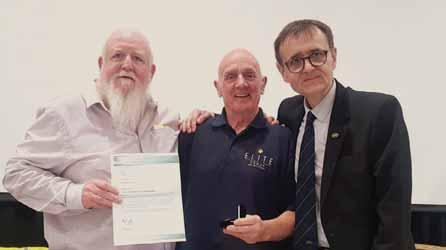
Anumber of officers and activists have retired in recent months including the union’s South East regional organiser Paul Cox who served the union as a member of 40 years. North West regional organiser John Tilley retired as 43 years service and national maintenance council member Ray Marney retired after 31 years membership.
With household finances under mounting pressure from the current cost of living crisis, we wanted to remind you that your RMT membership is there for you both in and out of work.
Over 68,000 RMT members have benefited from membership services which offer a variety of savings, as well as legal and financial support from our trusted partners.
Members are benefiting from cashback on their everyday shopping, exclusive car and home insurance rates, as well as protection policies designed with union members and their families in mind. Your family can benefit too!†
Union Rewards provides cashback and discounts from hundreds of online retailers. Access to Union Rewards is free to RMT members and includes a £10 Welcome Bonus for you.
RMTRewards.com


Don’t miss out on your RMT membership entitlement. Register for your FREE £5,000 Accidental Death Cover today:
RMTProtect.com/Member

Compare quotes online to see how much you could save on your car insurance. PLUS don’t miss out on their Price Match Guarantee - if you find a cheaper car insurance quote online, just call 0330 022 6657 and RMTCar guarantee to beat it!
RMTCar.co.uk
Earn up to 8% cashback on your everyday shopping with the RMT Prepaid Plus Cashback card!
RMTPrepaid.com/Magazine
“Any income RMT receives from these products goes into our dispute fund.”

With an expert panel of insurers, the home insurance comparison offers a discount for RMT members and searches for the best deals to suit your needs.
PLUS - get a quote before 30th November to be entered into our £2,000 prize draw!

RMTProtect.com/Home
Pays you a monthly tax-free income which can be used to pay your bills, your mortgage or your rent in the event you are unable to work due to an accident or sickness.
RMTProtect.com/Income
Life Insurance provides a cash lump sum payout when you die, money to help support your loved ones at a very difficult time. Key features of RMT life cover include:
Guaranteed acceptance
No medical questions
Fixed premiums - will not rise
RMTProtect.com/Life
Chinese seamen played an integral role during both World Wars, putting their lives at risk crossing the Atlantic to support the British war effort.
Over 2,000 Chinese seamen made Liverpool their home during these periods, settling in an area close to the port now known as China Town, forming relationships with local women and raising families.
However, rather than being celebrated for their vital role in the Battle of the Atlantic, many were cast out by the country they had risked their lives for. Ripped from their families and friends, they were rounded up by local police and forcibly repatriated in a secret government programme, without the knowledge of their loved ones and leaving no trace. Their wives and children spent decades not knowing what had happened, many believed that they had been abandoned and left destitute. Some died never knowing the truth.
The deportations were
shrouded in secrecy until the 1990s declassification of Home Office files titled ‘Compulsory repatriation of undesirable Chinese seamen’ lit a spark among their Liverpool-born descendants. They began to join the dots of their family history, seek answers, and to fight for justice.
After years of tireless campaigning by the children of these Chinese seafarers the truth has finally come to light.
When I brought the campaign to Parliament in a debate two years ago, I secured a Home Office investigation by the thenimmigration minister who promised to ‘leave no stone unturned’.
The resulting report paints a grim picture. Using Home Office documents, marriage records and archive material, it details dark dealings between British intelligence under the post-war Labour government, the Liverpool constabulary, and the shipping companies conspiring to forcibly repatriate – what they termed
– ‘undesirables’.
On their orders, hundreds of Chinese seamen were quite literally plucked from the streets at night and coerced onto ships docked in the Mersey bound for Shanghai, Hong Kong and Singapore, never to set foot on these shores again.
During the war, Chinese seamen were among the most highly exploited on British ships, particularly the Blue Funnel line. They occupied the more onerous and dangerous jobs, confined below decks for long stretches. Chinese and Lascar merchant seamen received lower wages than their British counterparts. At the time of the outbreak of hostilities in 1939, rates of pay varied between a quarter and a half of the British seamen.
This differentiation enabled
the major shipping companies to suppress wages and undercut conditions for British workers, thereby amplifying their profits. These conditions continued unabated for the first years of the war despite disputes and strike action on the part of both Lascars and Chinese seamen.
They eventually won a settlement in early 1942 that raised wages as well as an entitlement to the War Risk bonus that had previously only been paid to UK seamen or had been paid at a much lower rate.
After the war, the report notes that other foreign nationals were also not given leave to remain in Britain despite their service. However, the evidence shows that the Chinese seamen were specifically targeted for
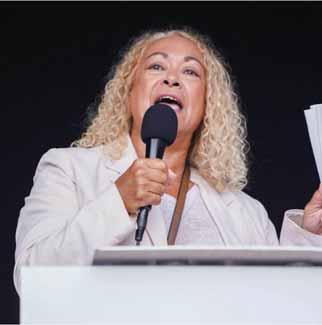
repatriation due to pressure to man war ships in the Far East as China slipped into civil war.
Home Office records reveal secretive meetings in late 1945 driven by the Ministry of War Transport and the shipping companies, primarily Holt (now Blue Funnel), with considerable involvement of the Liverpool police and the Home Office. The report details the discussions, recognising that the language used to explain and justify the decisions as ‘clearly racially inflected and prejudicial.’ Such language was especially prevalent when referring to mixed marriages. The Chinese husbands were negatively stereotyped as members of a criminal underclass wrought by ‘social evils,’ while the Britishborn wives were routinely denigrated as of ‘the prostitute class’.
The MP for the area at the time – and my own honoured predecessor – Bessie Braddock raised concerns in Parliament but was effectively stonewalled. There are also records of community meetings amongst the wives
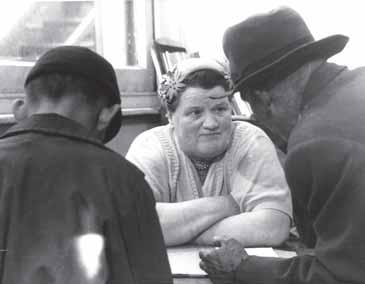
of the disappeared in Liverpool and Manchester. A newspaper in 1946 reported claims by Marion Lee, Liverpool wife of a Chinese seafarer, that 150 women and their children had been left destitute as a result without recourse except ‘enforced deportation to a foreign land to which we do not want to go’.
As Judy Kinnin, a Liverpoolborn child of a forcibly deported Chinese seafarer put it – ‘we just want to know what happened’. Her story will be covered by the BBC in an upcoming documentary. Others have been lucky enough to trace their father’s journey back to China, and discover family and halfsiblings across the ocean, but many have been left with little more than a photo, a distant memory, or stories from their mothers. Many descendants have only recently become aware of this heinous crime and the impact on them and their families.
In Liverpool, the community is in the process of establishing a memorial
garden close to China Town and a plaque exists at the pier head to recognise the important role played by Chinese seamen.
Liverpool City Council issued a formal apology in 2015 for the role it played in the forced deportations. However, while we have recognition from the current government and from the Labour leadership, the children
of the Chinese seafarers are yet to receive any formal apology for the pain and hardship their families faced. A justice delayed is a justice denied, but with the recent Home Office report and recognition of these events I believe that the door has been opened to win the apology these families have fought so long and hard for. The struggle continues.
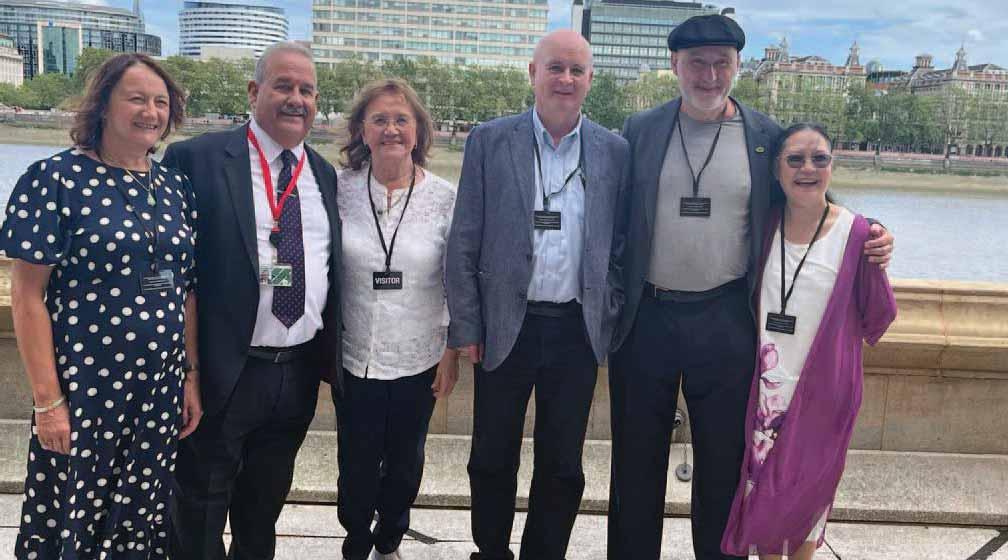


RMT has moved all of its merchandising to a new supplier called Pellacraft Limited. All stock is now advertised on the RMT homepage accessible at www.rmt.org.uk and new items and sales are updated regularly.
Depending on whether your branch has electronic banking with Unity Trust Bank or just uses a cheque book or makes bank transfers you will need to create a branch account with Pellacraft. This Pellacraft account is totally separate from your RMT Members log in to the RMT homepage.
There are several ways to get a Pellacraft account, firstly if your branch has electronic banking then you can click on the “Official RMT Branded Merchandise” banner at the top of the RMT homepage. You will then be taken to the Merchandise Shop, where you can register your details and create an account, or go to https://www.rmt-shop.org.uk/customer/account/create / once the Pellacraft account has been created you will need to contact Pellacraft to activate it.
If your branch uses a cheque book or you want to pay via a bank transfer you will need to make contact with Pellacraft before you can make an order. To set up a Pellacraft account you can follow the above guidance or this can be done either by Email at shop@rmt-shop.org.uk or by telephone at 01623 636602. Just explain that your branch uses a cheque book or you want to order via a bank transfer and they will set up your account for you and send you a login and password.
Log in to your Pellacraft account on the Merchandise Shop page, you will see at the top of the page the following selections; SALE, BOOKS, GADGETS, FLAGS, NEW, BADGES, BAGS, CLOTHING, CONFERENCES & EVENTS, DRINKWARE, GIFTS, UMBRELLAS and PENS, select the items your branch wishes to purchase and add them to your basket.
•When you are ready to purchase the items click on “proceed to checkout”.
•Select your delivery address.
•Select your delivery method, (This is dependant on what and how much you order).
•Select Payment method. If you are going to pay through PayPal, select the PayPal option and follow the instructions. If you are paying with a branch cheque you will need to select the “Purchase Order” box and write in NA. Then select “Place Order”.
•You will receive an invoice to the email address you gave when setting up the Pellacraft account, and then you should send the branch cheque for the total amount on the invoice.
•Cheques should be made out to PELLACRAFT LIMITED, and sent to: Pellacraft Ltd., Hermitage House, Hermitage Way, Mansfield, Nottinghamshire NG18 5ES
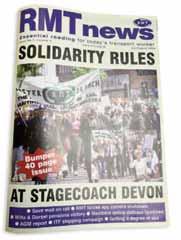

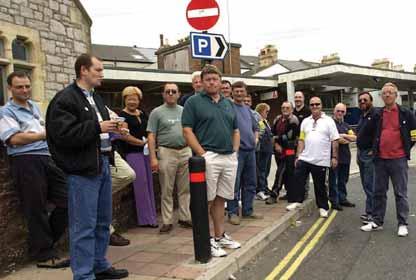

Whilst recently going through my old diary collection going back to 1998, the first year I became chairman of South Devon Bus Branch, I came across the 2003 RMT diary.
This was the year of the long-running and unforgettable RMT strike at Stagecoach Devon after the company attempted to slash pay and our terms and conditions. This was despite the fact that Stagecoach was making profits of in excess of 20 per cent every year.
Moreover, Stagecoach boss Brian Souter has also just awarded himself a 72 per cent pay rise, taking his pay to a whooping £800,000 a year.
And what is the reward for RMT members’ sacrifice?


Drivers at Stagecoach Devon
were paid just £5.93 an hour, one of the lowest rates in the country and nearly 20 per cent below the industry average.

In June, after weeks of preparation, RMT’s negotiating committee called a strike meeting to prepare to take eight days of 24-hour strike action throughout the month.
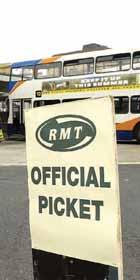
In an attempt to break the strike, Stagecoach Devon managing director Christopher Hilditch slapped an overtime ban on striking drivers, resulting in bus services being slashed in Exeter, Exmouth and Torbay on non-strike days.
Stagecoach also flew down drivers from as far afield as Aberdeen to cover the main service from Newton Abbot to Torquay and on to Paignton.But all other routes
were suspended and the cost must have been enormous.
Newly elected general secretary Bob Crow had just settled into the job, but he found time to turn up on the picket line on June 15. This was the first time I met him and, in the years to come, I was able to call him a friend. Later that day Bob marched with hundreds of members through the streets of Exeter. What a sight it was.
Finally, Stagecoach summoned the negotiating committee and, after protracted talks, RMT’s regional organiser Phil Bialyk and the team left triumphant with all our terms and conditions intact and a 5.2 per cent pay rise.
Each member may have lost




money during the strike, but all the terms and conditions stayed at least until I retired in 2016 after being a member since July 1986.
I became a member of the branch committee from 1997, then chair and junior rep till 2005 when I became full time rep. I have been involved in five AGMs and been a tutor since 2010. I would like to think I have done my bit.
To all members I would say this, remember that ‘Unity is Strength’. And as my tutor friendwho passed away a couple of years ago, Danny Ferguson would say, ‘Don't Let The Bastards Grind You Down’. Solidarity brothers and sisters.

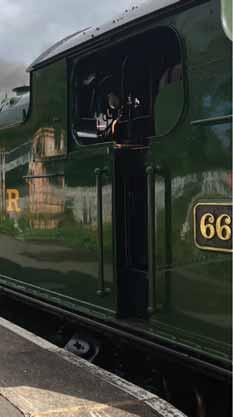

Formed in 1978, the Swindon and Cricklade Railway Preservation Society was one of the first heritage railways to undertake the complete reconstruction of a standardgauge railway with no legacy of track or buildings.
It currently operates between just north of Swindon and just short of Cricklade on a 2.5 mile section of the old Midland and South Western Junction Railway line that used to run from Andover, Hampshire, to Cheltenham, Gloucestershire.
The railway has reopened three stations: Hayes Knoll, Taw Valley Halt and Blunsdon, the headquarters of the line. Hayes Knoll features a restored signalbox that is operational during special events and a running/restoration shed.
The line extends north to South Meadow Lane, a few hundred yards from the site of a proposed Farfield Lane halt, near Cricklade, and south to Taw Valley Halt on the outskirts of Swindon, near Mouldon Hill Country Park. Unusually for a heritage railway there are opportunities to expand in both directions.
Blunsdon is the main visitor centre, with car parking, Whistle Stop Cafe, picnic area and shop while Hayes Knoll gives visitors the opportunity to see various restoration
projects progressing in the engine shed.
The engines on their fleet include Diesels of ex-BR Classes 03, Class 08 and a Class 73 electro diesel E6003
'Sir Herbert Walker', plus industrials. The Steam locomotive 6695 recently had a major overhaul and is now back in service. Other steam locomotives may appear as guest locomotives during the year.
At just 26 years old S&CR vice chairman Brad Robinson is the embodiment of the new
generation of heritage enthusiasts running the line. Brad is Fireman on today’s run working alongside Arron the Driver.
Brad helped rebuild the line’s beautiful Class 66 steam engine lovingly restored onsite in the rudimentary engine shed with a team of just eight or so who built her from scratch in under three years.
“Winters were hardest as we were pretty much open to the elements and operating in freezing temperatures,” he says with a smile.
This spirit is also running through the railway’s chairman Mark Abbott who is actually a year younger than his vicechairman.
Both outline big plans to expand the railway and attract visitors to their extremely friendly little railway. “We are very much a family here,” confirms Brad.
The biggest expansion of the railway is the ongoing return to Cricklade and the society has successfully passed the physical and psychological barrier of South Meadow Lane.

As a result of all this hard work, track is now on the ground farther north than at any time in the last 60 years.


Following many months of clearance activity and preparation they have now laid track to get as far as the initial Phase One target of Farfield Lane cutting and the tower of Cricklade church is now within sight!
Mark re-iterates the determination to reach Cricklade, a programme that has the full support of the village itself.

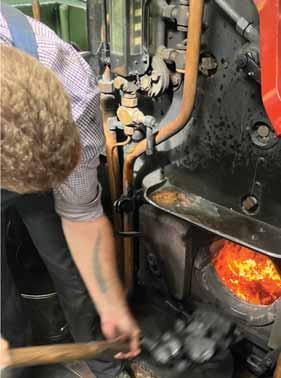
“We are still working within our Phase 1 budget and estimate that a further £8,000 is required to complete the necessary drainage, fencing and security gating. This will then allow us to operate trains over this extension,” he said.
This heritage line is clearly a real cultural hub of the community and deserves all the support it can get.
For more information go to: www.swindon-crickladerailway.org


You just save a minimum of £5 per month and then after a short time, you can borrow from us. As you pay down your loan amount each month, you only pay interest on the outstanding balance.
There are no hidden costs to saving and borrowing with the RMT Credit Union. If you pay up early you simply pay the balance and any interest due at the time. NO Handling or Administration charges and NO penalty charges.





We have accounts to help you put money aside for your holidays, Christmas or even encourage your children to save.


For more information, check the RMT Credit Union Website or fill out the application form on inside back page.
Run by RMT members for RMT members and their families.
The key to the RMT Credit Union is 'keeping it simple'
A member has been successful in his claim of race discrimination against his employer, Arriva Rail London Limited.
A member of black Caribbean descent has worked for Arriva Rail London Limited since April 2016 as an Information Controller.
Following a two-day hearing at London Central Employment Tribunal, the Tribunal unanimously found that allegations made in September 2019 and October 2019 that the member was threatening and intimidating him was race discrimination and that an investigation report that the member was late for duty and angry was race discrimination.
Arriva Rail London Limited admitted that a managers statement in a WhatsApp group regarding the Notting Hill Carnival that ‘if we are bringing Carnival into the office who is bringing the drugs and knives’. Arriva Rail London limited tried to argue that this was a stupid macho comment. Instead, the Tribunal unanimously found that this amounted to race harassment.
The Tribunal found that any financial award in respect of such comments should be subject to a 10 per cent ACAS uplift as Arriva Rail London Limited had failed to comply
with the ACAS Code. The claim was listed for a Remedy Hearing at a subsequent date.
This is an excellent outcome the member which arises from the terrible treatment that he was subjected to by his employer.
A member was injured while walking from the Signal Box towards the toilet. The member pulled the partially open door of the Signal Box towards himself and began to proceed forwards out of the Signal Box when suddenly and without warning, he tripped over a piece of metal rail that was on the floor that was being used as a doorstop causing him to fall forwards resulting in a jarring injury to his back.
The union submitted a claim to the relevant defendant solicitors and the defendant made a split liability offer of 50/50 alleging that our member was jointly responsible for the accident. This was disputed by the member and the decision was made to commence court proceedings. The claim proceeded under the County Court management, produced documentation to support why the defendant was responsible for our members accident.
Following the member being examined by an
appropriate medical expert, a medico-legal report was obtained that confirmed a back injury was suffered because of the accident which settled within 4-6 months of the accident. The injuries resulted in the member requiring time off work and a claim for loss of earnings. The union also sought recovery of medication purchased to aid recovery along with travel expenses for hospital attendances and care and assistance required whilst recovering from injury.
In response to the service of court proceedings, the defendants made a quantum offer to settle the claim in the sum of £4,000. Instructed Solicitors considered that the offer did not accurately reflect the injury suffered and following instructions being sought from our member, a counteroffer in the sum of £5,500.00 was made.

Solicitors successfully negotiated a settlement of £5,000. The settlement figure compensated injury, losses, and the effects on personal and family life.
A member, who works as a Customer Experience Host, was injured at work when he was working on the train. When he opened the fridge whilst the train was in motion,
his arm came into contact with a sharp edge of the bar running alongside of the fridge which is to prevent the door from opening too wide. Our member sustained a laceration to his arm from this sharp edge.
Thompsons were instructed to pursue a claim for compensation on the basis that our member’s employer had been negligent and had exposed him to a foreseeable risk of injury. Liability was admitted by the employer, indicating that they were aware of the sharp edge and had failed to take appropriate steps.
Thompsons went on to prepare the medical evidence required in order to properly quantify our member’s injuries. Our member was seen by an appropriate independent medical expert who prepared a report dealing with the injury that was sustained, how long it took to heal and any problems that arose as a result of this. Our member has been left with a scar to his arm, which although was expected to continue to mature, would remain permanently.
A settlement of the member’s claim was achieved in the sum of £4,500, which compensated him for his pain, suffering and loss of amenity as a result of his employer’s established negligence.




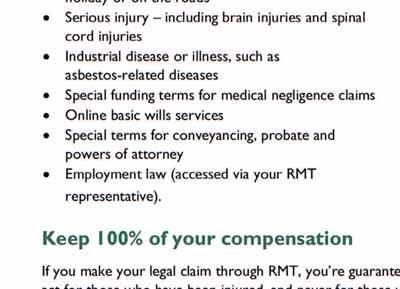
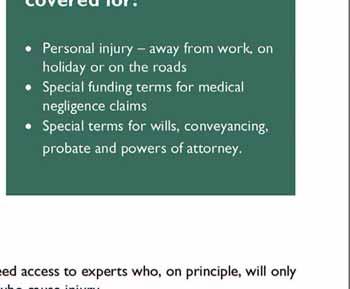


Thousands of football fans turned out in honour of the Black boxing legend and trade unionist once dubbed ‘Manchester’s Muhammad Ali’.
Over 1,200 people braved the Bank Holiday Saturday weather at Broadhurst Park, the grounds of fan-owned ‘rebel club’ FC United of Manchester, to watch a charity game between former FC United players and local luminaries from the worlds of sport, television, music and politics.


The match was organised by the Len Johnson Memorial Campaign, a group of community activists and trade unionists campaigning to raise funds to build a statue to Len Johnson in his home city.
A legendary boxing figure in British boxing, Johnson was born in 1902 in north Manchester to a Sierra Leonian father and an Irish-Mancunian mother.


After getting into a fight in a factory as a teenager, Len realised he was good with his fists and was taken to local boxing clubs by his dad.
From there, he soon rose through the local boxing
circuit to national renown, and his record –127 matches fought, 92 won, 29 lost and 6 drawn - saw him seeing off British and European legends like Ted ‘Kid’ Lewis and Leone Jacovacci. Boxing historians would later compare him to Muhammad Ali, who himself has spoken of his admiration for Len.
But Johnson was stopped from competing for the British middleweight title, as well as other serious major matches, because of his skin colour. The British Boxing Board of


Control, which was Britain’s national boxing authority, upheld a law passed by a Tory government prohibiting Black boxers from competing for titles – a ‘colour bar’ which deprived him of his shot at the top.
Disillusioned, he dropped out of boxing in 1933. But he carried on the fight in different ways. During World War Two, he joined the Communist Party and became active in anticolonial freedom movements, being a key organiser of the Fifth Pan-African Congress,
which was held in Manchester in 1945.
With two friends he set up the New International Club, one of Manchester’s first Blackran establishments. From there, he organised protests against Jim Crow rule in America’s deep south, apartheid in South Africa and poor conditions for Black immigrant workers here – as well as holding Manchester’s first calypso nights.
He also wrote for the Daily Worker about a wide array of boxers’ issues and was an

Len Johnson Memorial Campaign g p C a a n i m organised a football ootball f match to fund a statue for the eth black ac b k l boxing g boxin legend g d e e n lLEGEND: The Len Johnson All Stars FC
active trade unionist until his death in 1974.
People who volunteered to play in support of Len’s statue included Greater Manchester Mayor Andy Burnham, legendary boxers Ricky Hatton and Anthony Crolla, and TV stars from Coronation Street, Waterloo Road, All Creatures Great and Small and Gogglebox.
They faced off against FC United Legends, a team of former FCUM players which included Tommy Greaves,
Mike Norton and Rhodri Giggs. At the end of an energetic game, the teams had drawn 3-3, leading to a penalty shootout which FC United Legends narrowly won 7-6.
Joining fans on the day were trade unionists from a number of unions including the RMT, as well as many members of Len’s extended family. Speaking to RMT News, his great-granddaughter Darianne Brown said: “I was so proud and honoured to see so

many people come out to celebrate Len’s life and legacy.
“His story is finally being told and is reaching people, which is more than a dream come true for me and the rest of my family – it fills us all with so much gratitude that he’s being recognised for the true champion he was,” she said.
Meanwhile, match organiser and player Lamin Touray - who was also awarded the Man of the Match for his efforts putting the event together –told RMT News: “It’s been
The news that offshore windfarm construction companies boycotted this year’s UK government auction of renewable electricity generating contracts, which guarantee energy prices for 15 years, exposes private sector limitations in developing critical strategic infrastructure.
This biggest clean energy policy failure in a decade occurred when companies found offshore energy costs had jumped by 40% due to supply chain inflation. The absence of giant new offshore windfarms makes UK climate targets difficult to achieve.
Just six months ago RMT backed calls by workers in the UK offshore oil, gas and renewables sector for public ownership of energy companies to ensure that transition to net zero protects jobs, communities and the environment.
The private sector is failing future energy generation needs, as it failed our railways for thirty years. Today, private firms run less of our rail network than any time since Tory rail privatisation in 1993.
Out of seventeen passenger train operators across Britain, seven are run by the
Department for Transport’s Operator of Last Resort (OLR) or its equivalent in Wales and Scotland, three by foreign state-owned companies, and three by joint ventures that include foreign state-owned companies. Only four train operators are now run by private companies.
Rail privatisation was (mis)sold to the public as a way to bring competition, innovation and investment from the private sector. A total illusion, of course. Competition among train operators was always limited as a few bidders carved up the franchise cake. Genuine innovation requires long-term investment in research and development and private sector investment was minuscule.
The privatisation illusion relied on endless growth of passenger numbers and profits, guaranteed by periodic ‘franchising reviews’. Private passenger train operators are a net drain on the taxpayer.
It is easy to forget, that British Rail privatisation was sold as a model for the rest of the world to follow. Instead, the shutdown in world trade in 2020 during the Covid
pandemic exposed the inadequacies of privatised rail and logistics systems worldwide.
While the People’s Republic of China has constructed the largest high-speed rail network in human history - entirely in state ownership – and is reshaping the global economy through ‘One Belt One Road’a logistics network of rail, road and docks linking Asia, Africa, the Middle East and Europerail privatisation in Britain has proved to be incapable of delivering sustained investment at scale.
In July this year, the official infrastructure watchdog report into HS2, Infrastructure and Projects Authority, stated: ‘Successful delivery of the project appears to be unachievable.’
Yet, the ideological vested interests that feed parasitically off public sector investment continue to see public transport and freight logistics as a cash cow.
On 18 January 2023, the European Commission opened an investigation into ‘illegal state aid’ by French railways (SNCF) to its own publicly owned rail freight company, SNCF Fret. From 2007 to 2019
emotional to see so many people come together to celebrate Len Johnson’s legacy.
“I’d like to give a shout out to everyone who made the effort to come out, and would urge anyone who has been inspired by Len’s tragic but inspirational story to chip in to the campaign to ensure Len Johnson is honoured in the right way,” he said.
You can donate to the fund to build a statue to Len Johnson here: http://www.gofundme.com/f/manchest er-needs-a-len-johnson-statue
SNCF Fret is estimated to have received €4.3 billion, cancellation of financial debts of €5.3 billion, and a one-off capital injection of €170 million when it became a commercial company in 2020.
French railways is now preparing to liquidate SNCF Fret with the loss of 500 jobs, abandoning a third of its rail freight market and being banned from bidding for it for 10 years, transferring its locomotives to private operators and breaking SNCF Fret into two subsidiaries for private takeover.
As with our renewable energy needs, private ownership of passenger and freight rail is a drag on the technical and social developments needed to achieve modal shift from road to rail. Rail privatisation isn’t working. We need to move on.
Alex GordonAndy Gould of Nuneaton branch was presented with his 50-year badge on the picket line at Nuneaton recently after actually 53 years membership of the union.

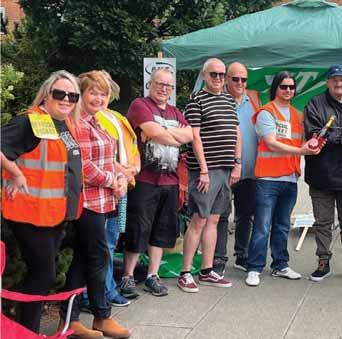
Nuneaton branch secretary Paul Reilly, Alex Croxall (Local Rep WMT) and RMT Midlands regional organiser John Watson did the honours.
Norwich branch sadly announced the passing of Balfour Beatty Rail Plant Rep Brother Peter Dyble who recently passed away following a short illness.

RMT regional organiser Stephen Skelly said that Peter was a member of the union for over 43 years and an active member of the branch.
“He was a rep for many years and very well respected amongst his colleagues,” he said.


6 Handle (4)
7 Tenant (6)
12 Upper house (6)
13 Control (7)
15 Group of six (6)
17 Clean (5)
18 Chalcedony (4)






